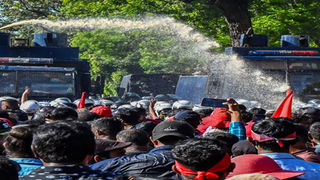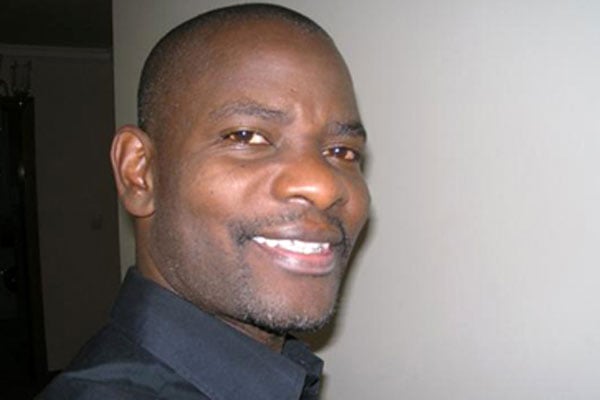
Sri Lankan police use water cannons to disperse anti-government protestors during a demonstration in Colombo last weekend. PHOTO/AFP
|People & Power
Prime
Ugandans need to learn from Sri Lanka to avoid wasting opportunity
What you need to know:
- The wellspring of the Sri Lanka crisis can be traced to one family--the family of former president Gotabaya Rajapaksa.
Sri Lanka has been going through serious upheavals in the last few weeks. Sometime before these upheavals, I opined about the possibility in the future for a revolution to occur in Uganda.
This statement was bitterly contested by two members of a WhatsApp forum I belong to. It was rather difficult for me to respond. However, with the events in Sri Lanka, it is now possible for me to respond, hence this article.
The best account of the events in Sri Lanka was given by Palki Sharma, formerly of WION television, broadcasting from India.
The wellspring of this crisis can be traced to one family--the family of former president Gotabaya Rajapaksa. This ruling family consisted of Mahinda Rajapaksa (former prime minister) and Basil Rajapaksa (finance minister).
Coming to power
Gotabaya and his brothers came to power in 2019. A year later he saw the passage of a constitutional amendment which enhanced the powers of the presidency. This power went into his head and he rode roughshod over the country.
He engaged in gross nepotism and corruption. He also greatly favoured the military in appointments. This was sometimes done in contradiction to ability. When this got exacerbated by mismanagement of the economy and the pandemic, there was a serious economic crisis.
When riots began, his brother resigned from the post of prime minister. Notwithstanding this, Gotabaya remained adamant and pledged to serve the remainder of his term of office. And so he appointed Ranil Wickremesinghe to the position of prime minister. The problem is Wickremesinghe was light-weight and could not help stem the tide.
By mid-July the economic crisis had reached untenable proportions. The protesters who had been peaceful had begun being violent. They burnt down the prime minister’s house and stormed the presidential palace. It is at this point that the president fled the country.
The above is a classic case of what Russian Marxist revolutionary Vladimir Lenin called the objective conditions of a revolution. According to Lenin, these objective conditions consist of, among other things, “…when the suffering and want of the oppressed classes have grown more acute than usual; when, as a consequence of the above causes, there is a considerable increase in the activity of the masses, who uncomplainingly allow themselves to be robbed in ‘peace time’, but, in turbulent times, are drawn both by all the circumstances of the crisis and by the ‘upper classes’ themselves into independent historical action”.
Without these objective changes, which are independent of the will, not only of individual groups and parties but even of individual classes, a revolution, as a general rule, is impossible. The totality of all these objective changes is called a revolutionary situation.
This is how the Sri Lankans took to the streets and went on to occupy the presidential palace, chasing away their president and other ministers.
These events of Sir Lanka came to me like a godsend. I had been arguing that struggles go on in phases. That we had gone through the anti-colonial struggles which ran from around 1900 to 1962. That we are now at the phase of national-democratic liberation.
A major task of national-democratic liberation struggles is to prepare ground for the eventual revolution.
In the WhatsApp forum, two people vehemently disagree with me. Nina Mbabazi rejected the struggle for national-democratic liberation. Somehow it is understandable in her case. She once publicly admitted that she is a reactionary and does not believe in revolutions.
The other person who disagrees with me is Maj Sabiti Mutengesa. He dismissed the struggles for national-democratic liberation and went on to ridicule the abbreviation ‘NDL’ I gave to national-democratic liberation as a national dancing club.
I had serious problems answering the two theoretically. With the events in Sri Lanka, I don’t need to marshal up theories to respond to them. Now I simply need to refer to Sri Lanka.
Conditions for revolution
What happened in Sir Lanka is what Lenin in his essay, The Collapse of the Second International called the objective conditions for revolution.
“...it is not every revolutionary situation that gives rise to a revolution; revolution arises only out of a situation in which the above-mentioned objective changes are accompanied by a subjective change, namely, the ability of the revolutionary class to take revolutionary mass action strong enough to break (or dislocate) the old government, which never, not even in a period of crisis, ‘falls’, if it is not toppled,” Lenin also stated.
By now it should be clear that the situation in Sri Lanka cannot give rise to a revolution. With all this uprising, admittedly something very difficult to attain, it should be clear that Sri Lanka will not go beyond what has already been attained by the Arab Spring. And this should be lesson number one.
Much as the objective conditions had been achieved in Sri Lanka, the subjective conditions are not yet mature. How do these conditions come about? The main way is by prosecuting national-democratic liberation.
By national-democratic revolution we mean revolutions which seek to end national and colonial oppression as a means of laying a basis of further struggles. They also seek to eliminate feudal and pre-feudal relations as well as establish new nations. National-democratic liberation also resists imperialism and its agents.
One of the major tasks of national-democratic liberation is to nurture the situation in which the revolution will eventually take place. In this regard a political organisation needs to be built. It is that political organisation that eventually leads the revolution.
Ugandan revolutionaries need to learn from Sri Lanka so as to avoid wasting opportunity to carry out a revolution the way it was done in Sri Lanka. They are just like the Arab Spring which had the objective conditions ripe for revolution but was totally unready.

Author, Yoga Adhola. PHOTO/COURTESY
The author, Yoga Adhola, is a leading ideologue of UPC




